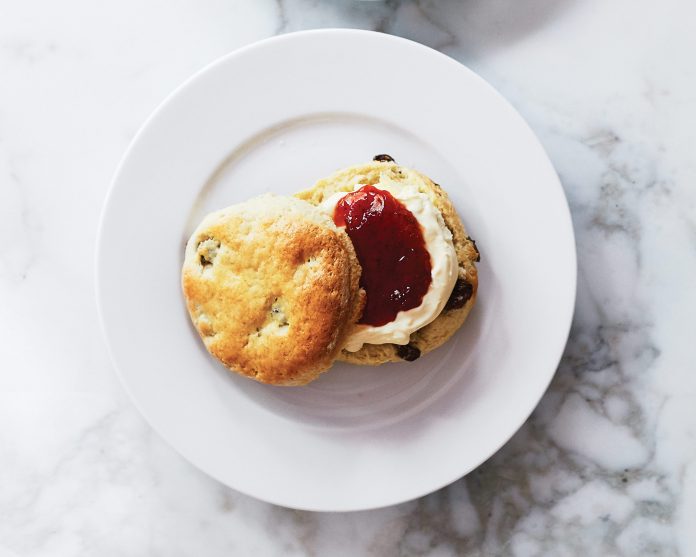
Edd Kimber, blogger behind The Boy Who Bakes, believes there aren’t many things better than a scone topped with clotted cream and jam. Scones are known the world over for a good reason! His recipe is fairly traditional but incorporates a slightly unusual kneading and resting technique he learned at Le Manoir, a two-star Michelin restaurant he spent a little time in after The Great British Bake Off. If you don’t have time for the resting, don’t worry—bake the scones as soon as they have been formed. They will still taste excellent; they just won’t look quite the same.
Traditional English Scones
Makes 8 scones
Ingredients
- 2¾ cups (344 grams) plain/cake flour
- 1 tablespoon (15 grams) baking powder
- ½ teaspoon (1.5 grams) kosher salt
- ¼ cup (57 grams) unsalted butter, cubed
- ½ cup (100 grams) caster sugar
- ½ cup (64 grams) raisins or sultanas, soaked in hot water for 10 minutes and drained
- ⅓ cup plus 1 tablespoon (95 grams) whole milk
- 3 large eggs (150 grams), divided
- Clotted cream and jam, to serve
Instructions
- In a medium bowl, whisk together flour, baking powder, and salt. Using a pastry blender or your fingertips, rub in butter until mixture is crumbly. Stir in sugar.
- In a small bowl, combine drained raisins, milk, and 2 eggs. Make a well in
center of dry ingredients. Add raisin mixture, and using a knife, stir together just until a soft, wet dough forms. - Turn out dough onto a heavily floured surface, and sprinkle with flour. Gently knead
dough by folding in half and then turning through 45 degrees. Repeat until dough is smooth and springs back slightly when pressed. (Be careful not to overwork the dough. This is a light, very brief action. You are not kneading bread; it is more of a folding motion to create a smooth dough and incorporate a little air.) - Line a baking sheet with parchment paper. Lightly sprinkle dough with flour, and roll to about 1-inch thickness. Using a 3-inch round cutter, cut dough, rerolling scraps as necessary. (When cutting scones, push the cutter into the dough using a straight up-and-down motion.) Place on prepared pan. Let rest for 1 hour. (Resting gives the scones a more refined, less rustic look. The baking powder gets to work, and the dough will puff out slightly, giving a slightly wider base, which, when baked, looks more like something you’d get at a
hote afternoon tea.) - Preheat oven to 390°F (200°C).
- In a small bowl, whisk remaining 1 egg; brush over top of scones (avoid getting any egg on the sides, as this will prevent the scones from rising properly).
- Bake until golden brown on top, about 12 minutes. Let cool slightly before serving with clotted cream and jam.




[…] Depending where you live, the term “scone” differs. English scones are more similar to American biscuits and they’re often topped with butter, jam, or clotted cream. American scones are different, but different isn’t necessarily a bad thing! Today’s scones are sweeter, heavier, and aren’t usually topped with butter because there’s so much butter IN them. Sweetness aside, there’s still room for vanilla icing or a dusting of confectioners’ sugar on top. By the way, here’s my favorite recipe for traditional scones. […]
[…] Depending where you live, the term “scone” differs. English scones are more similar to American biscuits and they’re often topped with butter, jam, or clotted cream. American scones are different, but different isn’t necessarily a bad thing! Today’s scones are sweeter, heavier, and aren’t usually topped with butter because there’s so much butter IN them. Sweetness aside, there’s still room for vanilla icing or a dusting of confectioners’ sugar on top. By the way, here’s my favorite recipe for traditional scones. […]
I’m gonna try this british scones for tomorrow! Yasss. Thank youuu
Wonderful recipe, thank you!
I am going to make it this evening. I will follow uup
I made a version of your scones with craisins and white chocolate chips and susubstitued honey vanilla Greek yogurt for milk. They are delicious! Thank you for sharing.
We’ve made several scone recipes and this one is The Best! My husband is English and we love High Tea and these scones were amazing! We made clotted cream too because we can’t get it here! We will keep this as our go to recipe from now on!
Thank you!
Edd,
I’m living in the beautiful mountains of North Carolina, where it is raining nonstop today, a perfect time to perfect the elusive, perfect formula,for the English fruit scone.
I am a good baker, but never “nailed” this particular bake, I’ve used Mary Berry’s recipe, also recipes from renowned bakers from Devon, but yours wins hands down.
It’s really puzzling as to why some recommend cake flour, some all purpose and others, strong bread flour.
Today I used an organic unbleached, all purpose, flour.
Thank you so much,
these are absolute perfection.
Maybe the one hour rest?
I put mine in the fridge, (you didn’t specify on the counter or the fridge )
I really truly mean “sincere thanks”
I grew up at Ireland, but I’m living in the United States 37years,
The Irish scone was not quite as rich as yours, going forward yours is definitely the scone I will be making!
Mary